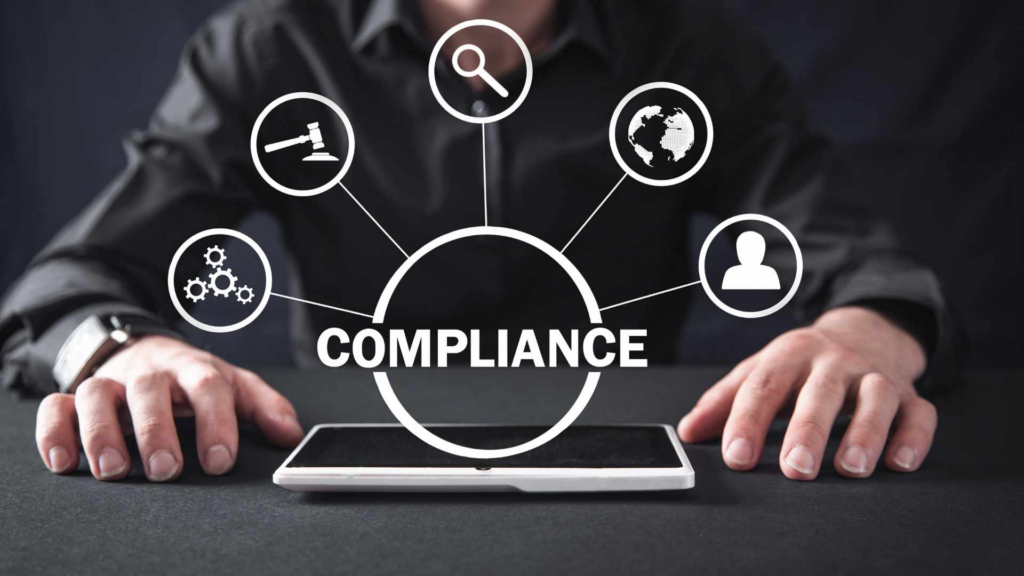Compliância – Enhance Your Business Experience!

Imagine you are the captain of a deliver navigating thru stormy seas. Your crew relies on your leadership to steer clear of rocky shores and treacherous waters. In the vast ocean of business, compliância is your compass, guiding you safely through regulatory storms and ensuring smooth sailing ahead.
Compliância is like following the rules to keep your business safe and sailing smoothly. It is about making sure everyone plays fair and stays out of trouble.
A Brief Introduction To Compliância – A Bird’s Eye View!
Welcome aboard for a bird’s eye view of compliância! In the vast landscape of business, compliância serves as a trusty guide, ensuring smooth sailing through the often turbulent waters of rules and regulations.

Imagine it as the bird soaring high above, offering a clear perspective on how to navigate through the complexities of legal requirements and industry standards.
At its core, compliância is all about playing by the rules. It involves establishing policies, procedures, and controls to ensure integrity in business activities.
By adhering to these guidelines, companies safeguard themselves against potential legal repercussions, reputational damage, and financial penalties that may arise from non-compliance.
But compliância is more than just a set of rules; it’s a mindset that fosters a culture of accountability and responsibility. It encourages transparency and ethical behaviour at every level of an organization, from the CEO to the newest hire.
By promoting a shared commitment to compliance, compliância helps build trust among stakeholders and enhances the overall reputation of the company.
Moreover, compliância isn’t a one-time task—it’s an ongoing journey. As regulations evolve and industries change, businesses must adapt and stay up-to-date to remain compliant.
This requires regular assessments, audits, and training programs to ensure that everyone within the organization understands their roles and responsibilities in maintaining compliância.
Why Compliância Is Important? – Know The Value In Business!
First and foremost, compliância serves as a shield against legal trouble. By adhering to industry regulations and laws, businesses can avoid costly fines, lawsuits, and other legal consequences.

This proactive approach not only protects the company’s bottom line but also preserves its reputation and credibility in the eyes of customers and stakeholders.
Furthermore, compliância fosters a culture of trust and integrity within an organization. When employees know that ethical behaviour and compliance are valued and expected, they are more likely to uphold these standards in their day-to-day activities.
This, in turn, helps mitigate the risk of internal fraud, misconduct, and unethical practices, which can erode trust and damage the company’s brand.
Moreover, compliância is essential for maintaining a level playing field in the marketplace. When all businesses adhere to the same set of rules and regulations, it creates a fair and competitive environment where success is determined by innovation, quality, and customer satisfaction, rather than by unethical or illegal tactics.
Additionally, compliância is increasingly important in today’s interconnected world, where businesses operate across borders and jurisdictions. With globalization comes a complex web of regulations and compliance requirements, ranging from data privacy laws to anti-corruption measures.
By ensuring compliância on a global scale, businesses can minimize the risk of regulatory violations and maintain access to international markets.
Read: Andrew Weissmann Wedding
Important Aspects Of Compliância – Explore Here!
Legal And Regulatory Compliância:
Legal and regulatory compliância forms the bedrock of any compliance program. It involves ensuring that a business operates within the bounds of applicable laws, regulations, and industry standards.

This aspect of compliância requires companies to stay abreast of ever-changing legal requirements in their respective jurisdictions and industries. From labour laws to environmental regulations, businesses must navigate a complex landscape of rules to avoid legal pitfalls.
Ethical Standards:
Ethical standards are the guiding principles that dictate behaviour and decision-making within an organization. While legal and regulatory compliância sets the minimum requirements for conduct, ethical standards go beyond mere legality to encompass broader notions of integrity, honesty, and fairness.
Upholding ethical standards involves fostering a corporate culture where honesty, transparency, and respect for stakeholders are paramount.
Effective Risk Mitigation:
Effective risk mitigation is essential for managing the myriad risks that businesses face in today’s dynamic environment. This aspect of compliância involves identifying, assessing, and mitigating risks that could jeopardize the achievement of business objectives.
Whether it’s financial risks, operational risks, or reputational risks, businesses must implement robust risk management processes to safeguard their interests.
Security Measures:
Security measures are critical for protecting sensitive information, assets, and resources from unauthorized access, misuse, or theft. In an increasingly digital world, cybersecurity has emerged as a top priority for businesses seeking to safeguard their data and systems from cyber threats.
This aspect of compliância involves implementing a range of security measures, such as encryption, access controls, and threat detection systems, to mitigate the risk of data breaches and cyber-attacks.
How To Implement An Effective Compliância – Must Apply These Strategies!
Access The Vulnerabilities:
The first step in implementing an effective compliância program is to identify and assess potential vulnerabilities within the organization. This involves conducting thorough risk assessments to understand the areas where the business may be exposed to compliance risks.

By examining internal processes, systems, and controls, businesses can pinpoint potential weaknesses and vulnerabilities that need to be addressed. This proactive approach allows organizations to prioritize resources and efforts towards mitigating the most significant compliance risks.
Set Proper Policies:
Once vulnerabilities have been identified, the next step is to establish clear and comprehensive policies and procedures to address them. These policies should outline the expected standards of conduct and guide how to comply with relevant laws and regulations.
Policies should be tailored to the specific needs and risks of the organization, taking into account its industry, size, and operational environment.
Read: Debra Weissmann
Provide Your Employees With Proper Training:
An essential aspect of effective compliância implementation is ensuring that employees understand their roles and responsibilities regarding compliance.
Providing comprehensive training programs helps employees recognize compliance risks, understand relevant laws and regulations, and learn how to adhere to company policies and procedures.
Audit Compliância:
Regular audits are critical for evaluating the effectiveness of compliância measures and identifying areas for improvement. Audits provide an independent assessment of compliance processes, controls, and activities, helping organizations identify deficiencies and gaps that may exist.
By conducting regular audits, businesses can ensure that compliância efforts remain aligned with regulatory requirements and industry best practices.
Ensure The Confidential Reporting:
Establishing mechanisms for confidential reporting is essential for encouraging employees to raise compliance concerns without fear of retaliation or reprisal.
This may include implementing anonymous reporting systems, whistleblower hotlines, or designated compliance officers who can receive and investigate reports of misconduct.
Make Sure The Discipline:
Finally, it’s crucial to enforce disciplinary measures consistently and fairly to address instances of non-compliance effectively. Employees must understand that violations of compliância policies will have consequences, ranging from corrective action to termination, depending on the severity of the offence.
Frequently Asked Questions:
1. How can compliância benefit small businesses?
Compliância helps small businesses navigate complex regulations, protecting them from fines and reputational damage, while also building credibility in the marketplace.
2. How often should compliância audits be conducted?
Compliância audits should be conducted regularly to assess the effectiveness of compliance measures, typically annually or biannually, depending on the industry and regulatory requirements.
3. What steps can businesses take to promote a culture of compliância?
Businesses can promote a culture of compliância by fostering open communication, providing leadership support, and recognizing and rewarding ethical behaviour among employees.
Conclusion:
Compliância is akin to adhering to guidelines to safeguard your business and ensure its smooth navigation. It revolves around fostering fairness and steering clear of trouble by ensuring everyone abides by the rules.
Read Also:



